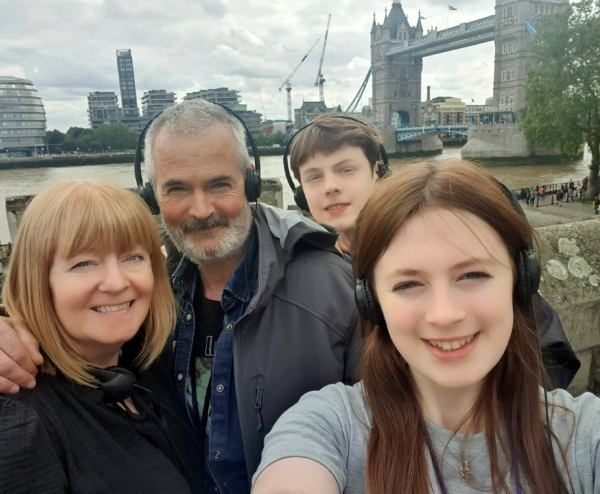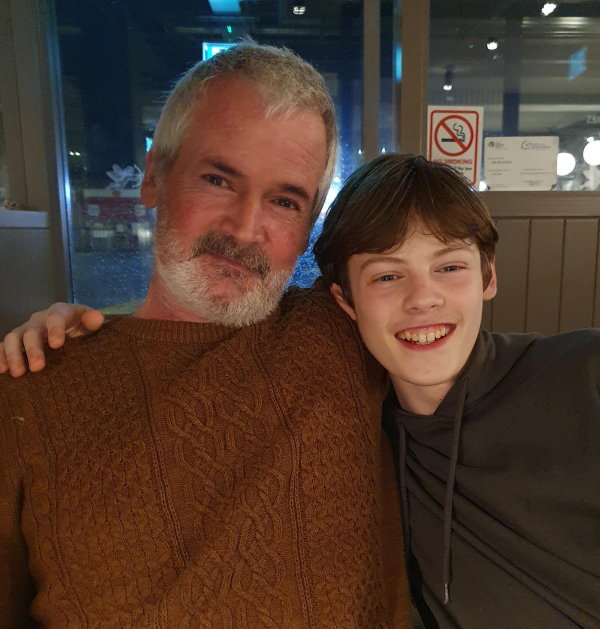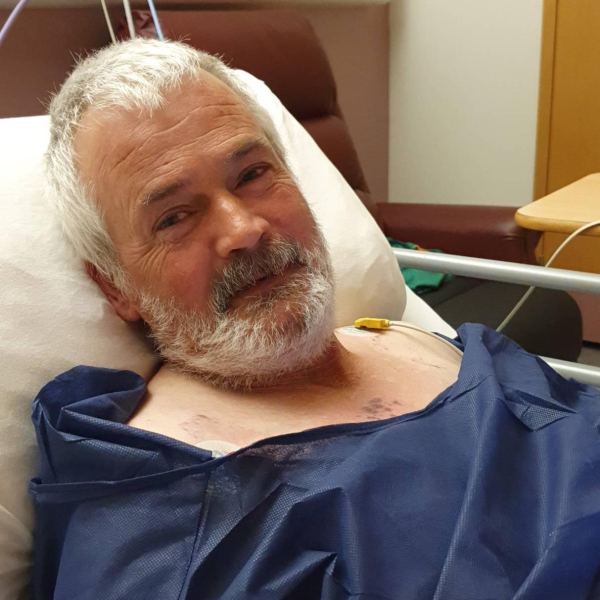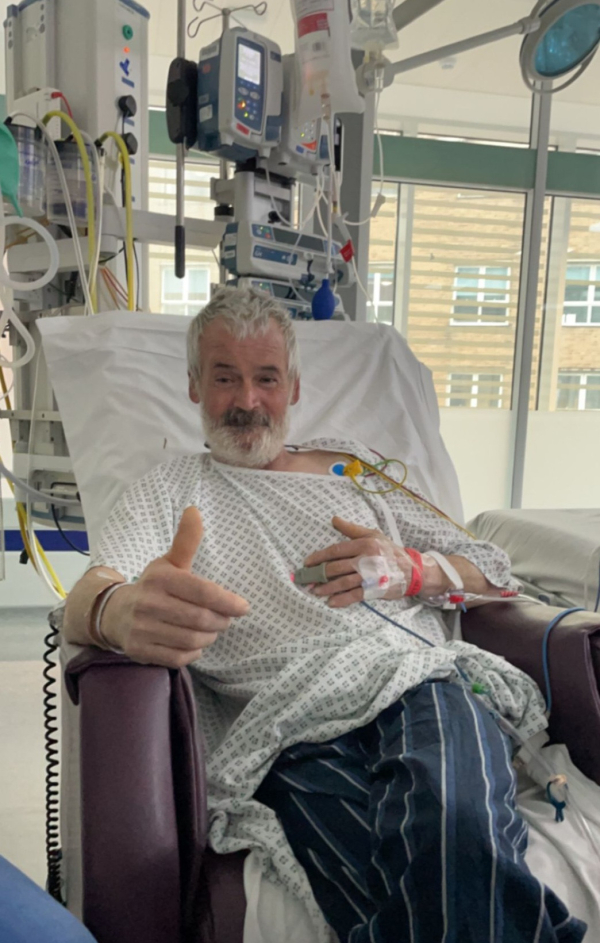
Today marks World Heart Day and with coronary heart disease being the single biggest cause of premature death in Northern Ireland (in people younger than 75) and 16 people having a heart attack here every day, local health charity, Northern Ireland Chest Heart & Stroke (NICHS), is using the day to put a spotlight on heart health.
In support of the charity’s work Nicola McCrudden, from Belfast, is sharing her story of how her partner Paddy Gallagher had an unexpected heart attack, followed by a cardiac arrest, earlier this year at the age of just 52. Nicola and Paddy want to spread awareness of how a heart attack can happen to anyone at any time and what people should do in this situation.
Nicola explains; “Paddy didn’t have any obvious signs or symptoms leading up to his heart attack. He had what is known as a widow maker heart attack which came on suddenly.”
“Paddy works in construction and was coming home from work tired. We put it down to him getting a bit older and the impact heavy work was having on his body, even though he was physically fit. He also had Long COVID and hadn’t been quite the same since. Looking back now however, the constant tiredness was a sign, but it was the only one.”
Recalling the day Paddy had his heart attack Nicola says; “We were in Donegal visiting family at Easter. That morning we had been playing football on the beach with the kids. We were in the car coming back when Paddy said, ‘Stop the car, I don’t feel well.’ It came completely out of the blue.”
“I didn’t like the colour of him. There is also a history of heart conditions in Paddy’s family. His father had a stroke at quite a young age, and he later died from a heart attack. We got out of the car, and I asked him ‘Can you raise your arms, can you speak to me?’ as I thought he might be having a stroke. He could raise his arms and talk but he was grey, and I just knew from looking at him that he was having a heart attack.”

“I was obviously extremely worried and drove to Paddy’s brother’s house nearby in Carrigart, thankfully he was in. He phoned an ambulance which was coming from Letterkenny and took around 45 minutes to arrive. The wait was awful- we were just trying to keep Paddy calm as he thought he was dying. He felt cold and clammy and had tightness in his chest, which was getting worse as time went by. Our two teenage children were in the house, although we kept Paddy in a separate room, but it was terrible for everyone.”
Nicola continues; “The ambulance call handler was on the phone the entire time and they were very helpful and supportive. They advised us to get Disprin and told us how much to give Paddy. That helped- he felt things easing but was still in a lot of pain and discomfort.”
“When the ambulance crew arrived, they administered medication which really helped, and Paddy felt a lot better after that. He was taken to Letterkenny University Hospital where he was stabilised. He was then transferred to Altnagelvin Area Hospital where he had five stents inserted. The next day he was transferred to the Mater Hospital in Belfast and was discharged after five days recovering there.”
“Everyone was telling us, ‘This is great, he’s had the stents, he’ll have a new lease of life, he won’t be so tired’. And that’s where I was at- he was out, and he was doing well.”
Nicola and Paddy thought they would be looking to the future and putting what happened behind them but unfortunately, worse was still to come.
Nicola explains; “A few days after Paddy came home from hospital I was at the gym. Our son Emmet, who was 12 at the time, phoned and said, ‘Daddy’s on the floor’. Paddy was having a cardiac arrest. I told Emmet to ring 999 and just dropped everything and ran out of the gym.”
“It was so frightening. In your mind you're thinking, he’s just a child, will he be able to do what needs to be done? When I got home five minutes later, Emmet was doing CPR with the call handler’s guidance. It is amazing he was able to do that at his age- he was alone and terrified but without a doubt his actions saved his Daddy’s life.”
“That is the first thing I would tell people to do in that situation- phone 999 immediately. The call handlers are the experts and will calmly talk you through what you need to do. It’s so important everyone knows that- adults, young people and children.”

Nicola continues; “I took over doing CPR. I was trained in CPR a very long time ago, but the call handler was there to help me and keep me right. CPR takes a lot out of you, and I told Emmet to run next door and get help. Thankfully, our neighbour Martin was in. He is CPR trained and took over. He continued until the emergency services arrived and we are forever grateful to him.”
“People may be scared of having to do CPR, but they shouldn’t be, it could save a life. Every minute matters in these sorts of circumstances. If Emmet hadn’t of been there and we weren’t able to start and continue CPR Paddy wouldn’t be here.”
“The ambulance crew arrived shortly afterwards, and they had to shock Paddy to get a pulse. This was a totally different situation to the first heart attack. Then, Paddy was in discomfort and knew something was wrong, but he was conscious and talking to us. This time around he was unconscious. The priority at this stage was to get a pulse and get him breathing. Thankfully the Air Ambulance doctors arrived simultaneously and were able to carry out a medical procedure to ensure oxygen flow.”
“Paddy was taken to the Royal Victoria Hospital and had an emergency stent procedure. One of the stents had clotted, causing a blockage, which resulted in the cardiac arrest. It's one of those things you never think will actually happen. You certainly don’t think it’s going to happen twice.”
After 2 weeks in hospital Paddy was able to go home and begin his second recovery journey.
Nicola explains; “Thankfully Paddy is doing well, all things considered. He isn’t working at the moment and isn’t able to do all the things he used to do, but he’s very lucky to be here. He understands that and has made significant lifestyle changes. Before his first heart attack he was a smoker- not a heavy smoker, but he stopped immediately. Although he doesn’t drink, he would have eaten a lot of sugary and fatty foods to keep his energy levels up at work and you wouldn’t have seen him eating a lot of fruit or vegetables. He eats completely differently now, much more healthily.”

When asked about his advice to others Paddy says; “It is all about looking at your lifestyle and looking after your heart. Be very conscious of what you are eating and try to be more active. It is important to make time for yourself, and to be aware of your work-life balance. When something like this happens, it is a reality check in terms of your life, your family is what is most important. We’ve had family and friends make changes to their lifestyles after what has happened to me and that’s great to see.”
Paddy continues; “If you are experiencing something you feel isn’t right for you health wise, whether it’s a twinge or constant tiredness or something that’s niggling you, go and get it checked out. I think it’s important that men hear this message. Sometimes we are less likely to ask for help and support, but it is important we do. Looking back now, it could have been a different story if I had got checked out when I was feeling constantly tired after work.”
Nicola adds; “We are very grateful to everyone who has been involved in Paddy’s journey from emergency response services, medical staff, cardiac rehabilitation team, family and neighbours. There is so much support, it has been great”.
“Paddy’s life has changed, and we are adapting as a family, but it hasn’t ended. It’s about coming to terms with what he can do and will be able to do in the future. Paddy sets himself goals and we’re very pleased with his progress.”
Fidelma Carter, Head of Public Health at Northern Ireland Chest Heart & Stroke, says, “We are very grateful to Paddy and Nicola for sharing their story and raising awareness of heart attacks, cardiac arrests and heart health.”
“This World Heart Day we would urge people to remember the STOP acronym. Unfortunately, a lot of people don’t realise they are actually having a heart attack. If you notice yourself or someone else presenting with any of these symptoms, don’t wait, call an ambulance immediately.”
“The STOP acronym stands for:
S – Something’s not right – symptoms can start slowly
T – Tightness or pain in the chest, pain in the arm, neck, or jaw
O – Other symptoms such as shortness of breath, nausea, or sweating
P – Phone 999 immediately.”
“The sooner a potential heart attack is recognised, and the faster medical help is sought, the better the chances of recovery are.”
If you have been affected by a heart condition and need support visit https://nichs.org.uk/care-and-support/heart-support for further information about Northern Ireland Chest Heart & Stroke’s support services.
